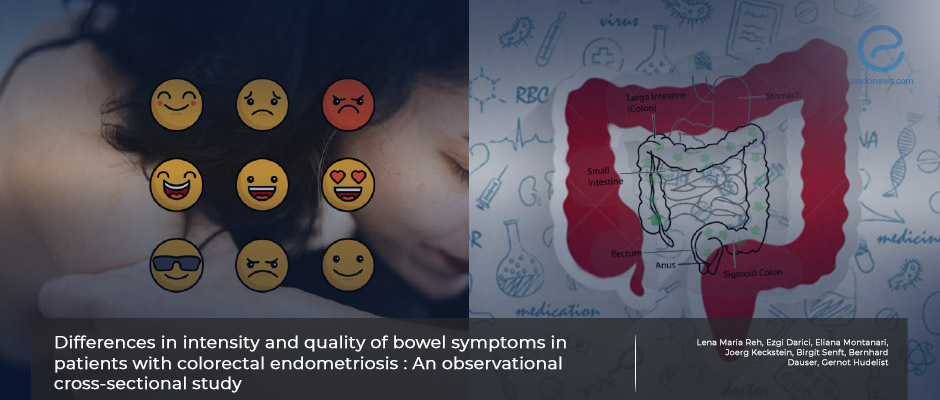Gastrointestinal symptoms in colorectal deep endometriosis
Jan 19, 2023
Patients with colorectal deep endometriosis suffer from bowel symptoms significantly, study shows
Key Points
Highlight
- Colorectal deep endometriosis patients exhibit significantly higher rates of gastrointestinal symptoms compared to healthy controls.
- The low anterior resection syndrome score (LARS) questionnaire should be used with caution when interpreting post-surgical scores as there could already be pre-existing complaints.
Importance
- Gastrointestinal symptoms are very common among endometriosis patients and alter the quality of life significantly.
- Colorectal deep endometriosis patients suffer from gastrointestinal complaints almost as much as pelvic pain symptoms.
What’s done here
- This is a prospective questionnaire-based study performed with 97 women with bowel deep endometriosis and 96 controls.
- It aimed to assess the prevalence of gastrointestinal symptoms in these patients prior to surgery.
- The gastrointestinal quality of life index and LARS questionnaires were applied to the participants and the results were statistically analyzed.
Key results
- The questionnaire revealed a significantly lower quality of life in bowel deep endometriosis patients compared to controls.
- Abdominal pain (92.8%) and bloating (84.5%) were the most common symptoms.
- Other common symptoms included epigastric fullness, flatus, belching, bowel frequency, abdominal noises, restricted eating, loss of enjoyment while eating, and fatigue.
- Change in appearance, feeling unfit, loss of endurance, loss of strength, sexual problems, and restrictions in daily life were also seen at a higher rate in the patients.
- The biggest difference between the two groups was in the emotional domain with patients experiencing high levels of anxiety, frustration, and unhappiness.
- 18.5% of colorectal deep endometriosis patients exhibited major LARS-like complaints and 27.8% had minor LARS-like complaints.
- LARS-like symptoms were seen in 11% of the healthy population.
Lay Summary
The colon, particularly the recto-sigmoid is the most commonly involved area in deep endometriosis. These patients suffer from gastrointestinal symptoms almost as much as pelvic pain symptoms the most common being reported as frequent and painful defecation. Gastrointestinal symptoms may be seen in endometriosis patients without deep endometriosis as well owing to various mechanisms such as local irritation, anatomical impairments, inflammatory environment, and coexistence of irritable bowel syndrome.
Researchers from Austria and Belgium performed a prospective questionnaire-based study with colorectal deep endometriosis patients. They aimed to evaluate the prevalence of pre-surgical gastrointestinal symptoms of these patients using two questionnaires: gastrointestinal quality of life index and low anterior resection syndrome score (LARS). The study was published in the November 2022 issue of the journal "Wiener klinische Wochenschrift"
Ninety-seven women with histologically confirmed bowel deep endometriosis and 96 patients without endometriosis were included in the study. They were asked to participate by answering the questions for the questionnaires prior to their surgeries. The gastrointestinal quality of life index assesses 5 domains (core symptoms, physical function, social function, emotional function, and trouble with treatment). The LARS normally evaluates bowel function after colorectal surgery.
The results of the gastrointestinal quality of life index questionnaire showed significantly lower quality of life in bowel deep endometriosis patients compared to controls. The most common gastrointestinal complaints reported by these patients were abdominal pain (92.8%) and bloating (84.5%) along with other significant symptoms such as epigastric fullness, flatus, belching, bowel frequency, abdominal noises, restricted eating, loss of enjoyment while eating, and fatigue. Other complaints that were seen at a significantly higher rate in bowel deep endometriosis patients included change in appearance, feeling unfit, loss of endurance, loss of strength, sexual problems, and restrictions in daily life. Around 60% of endometriosis patients stated they were experiencing problems with medical treatments. The biggest difference between the patient and the control groups in this questionnaire was seen in the emotional domain with a majority of patients experiencing high levels of anxiety, frustration, and unhappiness.
The evaluation of pre-surgical LARS scores revealed that 18.5% of colorectal deep endometriosis patients exhibited major LARS-like complaints and 27.8% had minor LARS-like complaints. It was also seen that LARS-like symptoms were seen in 11% of the healthy population. Therefore, the authors state that the assessment of bowel function after colorectal surgery should be approached carefully by taking into account the possibility of the complaints being present pre-surgically. They add that the use of LARS questionnaires should be performed with caution after surgery and pre-surgical scores might be helpful in the correct interpretation of the scores.
Research Source: https://pubmed.ncbi.nlm.nih.gov/36214904/
deep endometriosis colorectal gastrointestinal symptoms LARS GIQLI

